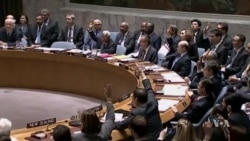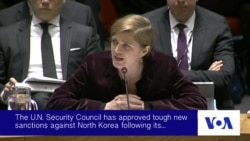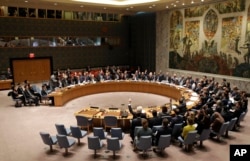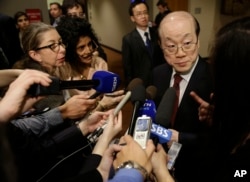North Korea fired several short-range projectiles into the sea off its east coast, Seoul said Thursday, hours after the U.N. Security Council adopted tough new sanctions against Pyongyang's nuclear and ballistic missile programs.
South Korea's defense ministry said it was still trying to determine the number and nature of the projectiles, which it said were fired into the Sea of Japan at 10 a.m. local time (1:00 UTC).
The move could be a response to the Security Council's unanimous approval Wednesday of sanctions against Pyongyang for its recent nuclear and long-range rocket launch.
Watch: U.S. Ambassador Samantha Power speaking at the U.N. Security Council.
“North Korea is the only country in the entire world that has conducted a nuclear test in the 21st century. In fact, it has conducted not one nuclear test, but four,” U.S. Ambassador Samantha Power told the council after the vote.
She said North Korea has consistently focused on its nuclear and ballistic missile programs instead of the basic needs of its people. “Virtually all of its resources are channeled into the relentless and reckless pursuit of nuclear weapons,” Power said.
At the White House, President Barack Obama welcomed the U.N. action.
"Today, the international community, speaking with one voice, has sent Pyongyang a simple message: North Korea must abandon these dangerous programs and choose a better path for its people," Obama said in a statement.
Robust measures
The U.N. resolution – which had more than 50 co-sponsors – has several unprecedented measures. One is the mandatory inspection of all cargo going in and out of the community nation. There is also a total arms embargo -- including both conventional and other weapons -- and restrictions on the sale of coal from North Korea, as well as other minerals, including gold, iron, iron ore and titanium.
A provision in an earlier draft of the text to ban the sale or supply to North Korea of aviation fuel – which is also used to power rockets – was revised in the final resolution to include an exception for civilian passenger aircraft flying to and from North Korea.
Banking sanctions have also been tightened, as well as bans on the sale of luxury goods to North Korea. In addition, travel bans and asset freezes have been imposed on 16 new individuals.
Firm response
Chinese envoy Liu Jieyi expressed Beijing’s anger at North Korea’s January nuclear test and February rocket launch, saying his government “has expressed its explicit opposition to these actions.”
“This resolution demonstrates the seriousness of the international community in opposing the further development of DPRK nuclear and missile capacities,” Ambassador Liu said. He urged a resumption of dialogue to restart stalled six-party talks aimed at ending Pyongyang’s nuclear program through diplomatic negotiations. China is North Korea's most important ally.
Russia had delayed a planned Tuesday vote on the resolution for 24 hours while it pressed for some changes to the text. One change was the removal of a North Korean mining executive operating in Russia from a list of individuals designated for asset freezes and travel bans.
Both the Russian and Chinese envoys expressed concern about U.S. and South Korean consultations about the possible deployment of the U.S.-made THAAD anti-missile system, saying Pyongyang’s behavior should not be used as a justification to increase military capabilities in the region.
South Korea’s envoy, Oh Joon, was allowed to address the council. He spoke directly to North Korea, saying it does not need such sophisticated weapons systems and that perceived international threats against it are “ a figment of your imagination.” He urged Pyongyang to give up its nuclear weapons and join the international community to live in peace and security.
No North Korean diplomat spoke at the session nor was seen around the council during the meeting.
U.N. Secretary-General Ban Ki-moon issued a statement welcoming the resolution. He urged North Korea to abide by the resolution and called on all nations to ensure its implementation. Ban also renewed his call for North Korea to genuinely improve human rights, saying it is “a necessary basis for long-term security and stability.”















